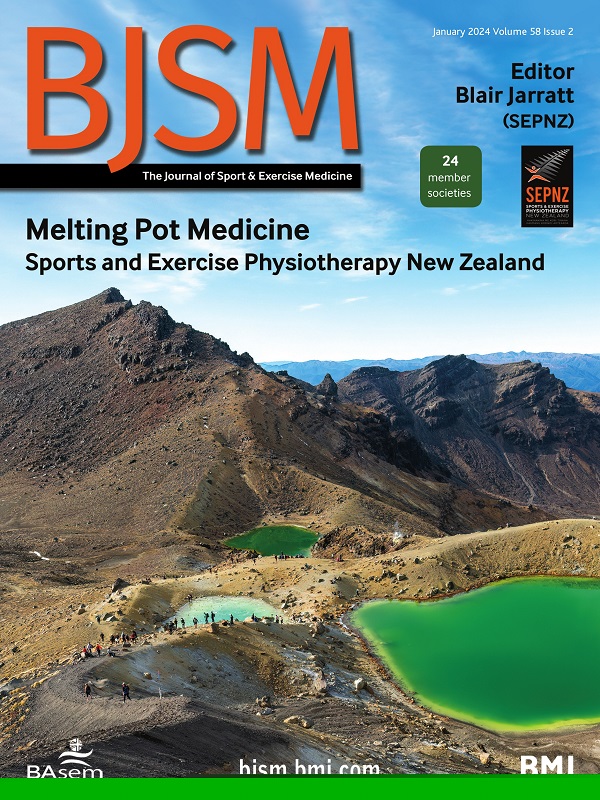国际奥委会共识声明:体育运动中的人际暴力与安全保障
IF 11.6
1区 医学
Q1 SPORT SCIENCES
引用次数: 0
摘要
目标 体育运动中的人际暴力(IV)因其主观性和复杂性,在界定、预防和补救方面具有挑战性。2024 年国际奥林匹克委员会人际暴力和保障共识旨在综合体育运动中人际暴力和保障的证据,引入体育运动中人际暴力的新概念模型,并通过将证据与奥林匹克运动员的见解相结合,为体育生态系统中的所有人提供更易于理解的保障指导。方法 由 15 名成员组成的专家小组按照乔安娜-布里格斯研究所的方法进行了范围界定审查。采用开创性著作驱动法来确定相关灰色文献。成立了四个写作小组,重点关注:定义/流行病学、个人/人际决定因素、背景决定因素和解决方案。写作小组就各自的主题编写了有参考价值的科学摘要,所有成员在共识会议上对这些摘要进行了讨论。然后,每个小组制定建议,以投票声明的形式提交,并按照德尔菲协议进行保密投票,事先将≥80%的一致意见定义为达成共识。结果 在 48 份投票声明中,有 21 份在第一轮投票中达成了共识。在第二轮和第三轮投票中,22 项声明达成了共识,5 项声明被终止,2 项声明在未能达成一致意见后遭到少数人反对。共有 43 份声明达成共识,分别作为总体(5 份)和专题(33 份)共识建议以及可操作的共识指南(5 份)提出。结论 本次证据审查和达成共识的过程阐明了体育运动中静脉注射和保护的特点和复杂性,并表明需要采取全系统的方法来充分理解和预防静脉注射。强调相互关爱、以运动员为中心、促进健康的人际关系、贯彻以创伤和暴力为基础的关爱原则、融合不同观点以及衡量预防和应对 IV 的有效性的体育环境将成为安全体育的典范。体育生态系统中的所有各方都需要共同承担责任,通过未来的研究、政策和实践来推进有效的保障措施。本文章由计算机程序翻译,如有差异,请以英文原文为准。
IOC consensus statement: interpersonal violence and safeguarding in sport
Objective Interpersonal violence (IV) in sport is challenging to define, prevent and remedy due to its subjectivity and complexity. The 2024 International Olympic Committee Consensus on Interpersonal Violence and Safeguarding aimed to synthesise evidence on IV and safeguarding in sport, introduce a new conceptual model of IV in sport and offer more accessible safeguarding guidance to all within the sports ecosystem by merging evidence with insights from Olympic athletes. Methods A 15-member expert panel performed a scoping review following Joanna Briggs Institute methodologies. A seminal works-driven approach was used to identify relevant grey literature. Four writing groups were established focusing on: definitions/epidemiology, individual/interpersonal determinants, contextual determinants and solutions. Writing groups developed referenced scientific summaries related to their respective topics, which were discussed by all members at the consensus meeting. Recommendations were then developed by each group, presented as voting statements and circulated for confidential voting following a Delphi protocol with ≥80% agreement defined a priori as reaching consensus. Results Of 48 voting statements, 21 reached consensus during first-round voting. Second-round and third-round voting saw 22 statements reach consensus, 5 statements get discontinued and 2 statements receive minority dissension after failing to reach agreement. A total of 43 statements reached consensus, presented as overarching (n=5) and topical (n=33) consensus recommendations, and actionable consensus guidelines (n=5). Conclusion This evidence review and consensus process elucidated the characterisation and complexity of IV and safeguarding in sport and demonstrates that a whole-of-system approach is needed to fully comprehend and prevent IV. Sport settings that emphasise mutual care, are athlete centred, promote healthy relationships, embed trauma and violence-informed care principles, integrate diverse perspectives and measure IV prevention and response effectiveness will exemplify safe sport. A shared responsibility between all within the sports ecosystem is required to advance effective safeguarding through future research, policy and practice.
求助全文
通过发布文献求助,成功后即可免费获取论文全文。
去求助
来源期刊
CiteScore
27.10
自引率
4.90%
发文量
217
审稿时长
3-8 weeks
期刊介绍:
The British Journal of Sports Medicine (BJSM) is a dynamic platform that presents groundbreaking research, thought-provoking reviews, and meaningful discussions on sport and exercise medicine. Our focus encompasses various clinically-relevant aspects such as physiotherapy, physical therapy, and rehabilitation. With an aim to foster innovation, education, and knowledge translation, we strive to bridge the gap between research and practical implementation in the field. Our multi-media approach, including web, print, video, and audio resources, along with our active presence on social media, connects a global community of healthcare professionals dedicated to treating active individuals.

 求助内容:
求助内容: 应助结果提醒方式:
应助结果提醒方式:


